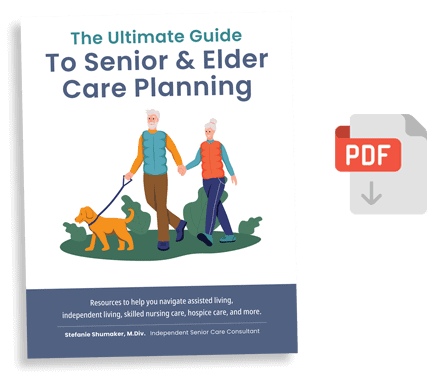The Ultimate Guide To Senior & Elder Care Planning
 By Stefanie Shumaker, M.Div.
By Stefanie Shumaker, M.Div.
Chapter 1: How to develop a senior aging plan that respects the voice and wishes of your loved one
It is difficult to know where to begin. You may feel like your loved one is not ready to talk about their later years. Or, you may not know how to bring up the subject.
Through countless meetings with hospice patients and their families, I have watched some move forward with a positive plan while others seem to struggle. The successful meetings begin with a family creating a safe space for an elderly person to express his or her hopes, wishes, fears, questions, etc. After all, it is his or her life at the center of the discussion. I believe a person is more open to change or suggestions offered by their family if he or she first feels heard and listened to. Telling your aging loved one what’s going to happen or making decisions behind their back will only create tension in your relationship and cause them to have a negative response to any change. Of course, there are situations when the person may not cognitively be able to identify or express their wishes. In that situation, it is best to acknowledge with them that change and loss of independence is very difficult, but you believe the path forward will best support them in being safe and thriving in life.
 Here are three simple tips for these difficult conversations:
Here are three simple tips for these difficult conversations:
- Communicate your concerns. Bring up the topic early. Start this conversation before a significant cognitive decline or crisis occurs.
- Be proactive about the conversation. Approach it in a positive way. You could start with, “Have you been thinking about your later years? Where you might live? What support you might need?”
- Talk face-to-face. Avoid busy holidays or gatherings. Talk without distractions. Begin this conversation while you are spending time with your loved one.


